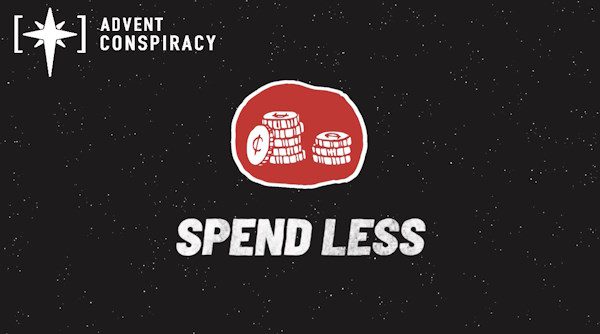A congregation of the United Church of Canada

Yr B ~ A2 ~ Mark 1:1-8
You all know the song called “The Twelve Days of Christmas”, right? If you totalled up all the gifts of all the days, including the repetitions, you’d have 364 gifts! Anyone care to guess how much it would cost to buy all 364 items repeated in all the verses of “The Twelve Days of Christmas” – from 12 drummers drumming down to what would become a dozen partridges in pear trees? Any guesses? It would cost $201,972.66, according to the annual Christmas Price Index. Now, if that’s a little rich for you, and you decided to just buy each day’s gifts separately – one partridge, two turtle doves, three French hens, etc., it would only cost you $47,000. Oh, and those numbers are US dollars.
Perhaps our title today – “Spend Less” – is very well chosen. Now, by championing the idea of spending less I’m not saying Bah Humbug to Christmas! When we say “Spend Less” on Christmas we don’t mean to do away with your traditions, and giving and receiving gifts. Not at all. I have every intention of buying gifts for my family and friends this Christmas and I’m hoping to receive some as well.
The message isn’t “spend nothing” – or “shun the mall” – or “down with Santa”. It’s about perspective. There’s a movement out there called ‘buy nothing Christmas’ which favours, as you may have guessed, buying nothing. They too are not skipping Christmas, but they are completely eliminating the mall. Maybe that’s where you’d like to go – that’s fine. If ‘buy nothing’ feels like the right move for you this festive holiday season then by all means, buy nothing. But I don’t think that’s required to live it faithfully.
What we’re talking about is a renewed way of seeing Christmas – or maybe it’s actually a very old way, I’m not sure. What is sure is that we’re hoping that Christmas can be different this year – that it could be transformed.
One thing we’ve transformed over the years is how we approach Advent. Advent is a season of preparation and waiting for the coming of the light of the world, and in the past many churches (and ministers, myself included) studiously avoided any references to Christmas. Now, that may be good theologically – and it does make perfect liturgical sense – but it misses the boat when we’re trying to relate to our culture.
The world as we know it is enthralled with Christmas stuff already. They’re not waiting until the so-called correct liturgical time. They’re in it now. Holding fast just makes us seem more out of step with the world than they already think we are. So I think we need to be talking about Christmas now too – and, like we said last week, instead of fighting it – transform it!
So, once again this year we’re participating in this thing called an Advent Conspiracy. Gone are the classic churchy doom and gloom, ponderous, weighty, sin and repentance themes, and instead we’re exploring these themes: worshipping fully, spending less, giving more, and loving all. And so we turn to our text for today. One of my absolute most favourite characters in the bible, John the baptizer, preaching on the banks of the River Jordan proclaiming a baptism of repentance for the forgiveness of sins.
I know, I know what you’re thinking – “But Larry, you just said we weren’t doing that whole repent thing – and now you’re throwing the king of repentance at us!”
Yes, I am – but it’s not what you think.
Classically, churches have talked about repentance as requiring regret, guilt, or remorse. But the word has another dimension to it, as we’ve studied before. The word is translated from the Greek metanoia. Meta means after, or beyond, and noia refers to knowing, perceiving. Put together, ‘to repent’ literally refers to the change in our thinking that happens as a result of what we observe or perceive; in other words, it signifies a change of mind, a change in worldview.
A metanoia is a reorientation, a fundamental transformation of outlook that includes how we see ourselves and how we see the world. And because ‘to repent’ is to change the way we think, ultimately, it means to change the way we act. Metanoia – repentance – is that kind of transformation: an inner change that results in outer deeds – like spending less – or digging a well. When John and Jesus ask us to repent, they are talking about that kind of change – from the way of imperial Rome to “the way of the Lord” – from the way of over-commercialized Christmases to the way of hope, peace, joy, and love.
That’s the actual meaning of the word ‘repent’ – to radically change the way you look at something. So, John in the wilderness, and Jesus whenever he preached, were saying to anyone who’d listen – “Hey you – you need to change the way you look at things. Why? Because God’s kingdom isn’t far away, it’s right here, right now.” It’s in you – living right inside you – just like the Christmas story of God’s incarnation in Jesus.
This is the perfect text for “Spend Less” Sunday. Repent! Change the way you see things. Change the way you perceive Christmas. Transform your celebration from being about Giftmas into being about God’s moving in the world, and in you. Step off the treadmill of shop, shop, shop and take another look at why you’re doing this whole Christmas thing. What’s the point? And what’s preventing you from seeing the point?
Consumerism, or Giftmas as we called it last week, has definitely taken over Christmas. Just to show you how confused people are, a Canadian poll from a couple of years ago showed only 10% of adults thought this season was primarily a religious celebration – 53% said the religious part had some significance – and 34% said it was completely secular for them. Curiously, 80% of Canadians feel very strongly about using the word Christmas instead of Holiday Season. Christmas is clearly very important to them – just not the religious part. Oh, and by the way, in 1995 just over half of Canadians said they planned to attend a church service over the holidays, and 25 years later that number was well below 20%.
And this one really gets me. Despite the drastically waning interest in the religious aspects of the season, nine out of ten people said Christmas had become too commercialized. And yet, even with all the holiday TV shows that everyone knows and loves so well (and the endless sermons!), we still tend to fall into the trap of trying to buy Christmas presents rather than experiencing Christmas Presence.
My favourite Christmas show is the cartoon version of “The Grinch”. Do you remember how it ends? The Grinch experienced something that totally changed the way he saw Christmas. It says at the end, “Then the Grinch thought of something he hadn’t before. Maybe Christmas, (he thought) doesn’t come from a store, maybe Christmas perhaps means a little bit more!” And we recite that every year from memory, even as we elbow our way through the crowds to get that last present for that last person on our list.
Put in spiritual terms, what the Grinch experienced was a trip to the Jordan and a dunking by John the Baptizer! The Grinch had a profound metanoia – a radical shift in perspective that allowed him to see a spiritual truth he hadn’t seen before. He repented! Nothing outside of him was different – nothing new happened that hadn’t happened before – he just had a spiritual awakening that revealed what had always been true but he’d been unable to perceive – that Christmas wasn’t about presents, but about Presence.
That new perspective is exactly what metanoia means. The Grinch, in a manner of speaking, heard John the Baptizer crying out in the wilderness (on Mt Crumpett), “Prepare the way of the Lord, make his paths straight.” And the Grinch’s small heart grew three sizes that day. And his Christmas was transformed from Giftmas into something closer to the truth.
The hardest part of the John the Baptizer story is the ‘what next?’ What happens to all those people after they get out of the water, dry off, and make their way back home? How then shall they live? If you’re going to have a change of perspective, you’ll want to make sure your life matches it. In other words, you put your money where your mouth is. The Grinch didn’t stay up on Mt Crumpett feeling all superior because he finally ‘got it’. He raced down the mountain and tried his best to do Christmas right. He became generous, and more importantly, he became warm – he became loving.
So – warm, and generous, and loving – sounds like someone who’d buy a lot of Christmas presents for people! Possibly, but not necessarily. Think of it this way. What are you really trying to accomplish with your gift giving? Are you consciously trying to recreate the gifts of the wise men? (Me neither). Are you trying to impress someone with the whole 12-days catalogue? (Gosh, I hope not!) Are you trying to equate how much you care with how much money you spend? Have you ever given it much thought? I haven’t.
But simply “spending less” doesn’t automatically fast track us to understanding Christmas more either. Experiencing the metanoia, feeling the awakening, having that “aha” Grinch-moment when you realize that Christmas is about something more, simply puts you in a better head space and heart space to view the whole season with. And what you’ll hopefully see – what I’m trying to see myself – is that buying presents is actually a pretty lousy way of demonstrating my warmth and generosity to the people I care about. Spending less will push me to figure out more meaningful ways to communicate how I feel.
We’ll talk more next week about the giving side – especially about giving ourselves – which is the best way to express our warmth, and generosity, and love for people. But for now, it’s enough to focus on the Conspiracy of being really counter-cultural, and transforming this whole Christmas thing from presents (with a ‘t-s’) to Presence (with a ‘c-e’).
Last Sunday we talked about how Christmas actually happens every day inside of us when we wake up and claim the gift of God’s light and love flowing through us. God’s love is incarnated in us – just like it was in the baby Jesus in our Christmas stories. And our whole Christmas season should be a response to God’s incomprehensibly wonderful movement in our souls.
So, this Christmas, I encourage you to respond by ‘spending less’ – not because ‘stuff’ is bad, but because ‘stuff’ can’t come close to expressing what you really want to express. Spend Less – not necessarily because you spend too much, but because it makes us focus on the wrong kind of value. Spend Less – not because the preacher guy guilted you into donating to a well drilling project, but because spending more just doesn’t make sense anymore – not after you’ve seen the light – not after you’ve had that “aha” – not after your metanoia – not after John the Baptizer has gotten through to you.
Spend Less can simply mean don’t buy-in to the way Giftmas has taken over. Join the conspiracy. Dare to see it differently. Enter the Christmas story and the Christmas season with a new perspective. Repent – it truly is the beginning of the good news of Jesus Christ! Amen.



